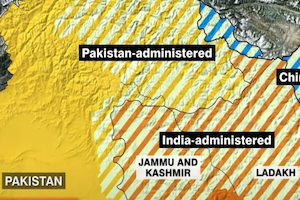India-Pakistan Conflict Disrupts Civilian Flights; Pakistani Defense Minister Urges U.S. to Help De-escalate Tensions

Tensions between India and Pakistan escalated on the 7th, with India launching "Operation Sindoor," conducting airstrikes on Pakistan and Pakistan-administered Kashmir. Pakistan, citing posts on social media, claimed it had shot down five Indian fighter jets and one drone, a claim India has denied. Dozens of civilian casualties were reported on both sides.
Initially, Pakistani aviation authorities maintained that the country’s airspace remained open and that “civil aviation activities were being conducted safely.” However, on the morning of the 8th, authorities abruptly closed four major airports—Islamabad, Karachi, Lahore, and Sialkot—citing "operational" reasons. The situation in the so-called "powder keg of South Asia" appears to be heating up.
The flare-up in the conflict was triggered by a terrorist attack on February 22 in Indian-controlled Kashmir, where militants from the “Kashmir Resistance” killed 26 Indian tourists. It was the deadliest such attack in nearly 20 years. India blamed Pakistan, accusing it of harboring and supporting militant groups, and subsequently suspended participation in a water-sharing treaty. On the 7th, India launched airstrikes targeting the infrastructure of terrorist organizations.
Satellite imagery showed a mosque in Bahawalpur, a city in Pakistan’s Punjab province, had been destroyed. India considers Bahawalpur a major hub for the Islamist group Jaish-e-Mohammed (JEM), which is active in Kashmir, and the mosque was believed to be one of the group’s training centers.
The international community has called for restraint from both countries. Pakistani Defense Minister Khawaja Muhammad Asif said in an interview that Pakistan does not initiate attacks on India but will respond if attacked. He added that if India takes a step back, Pakistan will also de-escalate. He praised former U.S. President Donald Trump and called on the United States to help resolve the conflict between India and Pakistan.
- 221 reads
Human Rights
Fostering a More Humane World: The 28th Eurasian Economic Summi

Conscience, Hope, and Action: Keys to Global Peace and Sustainability

Ringing FOWPAL’s Peace Bell for the World:Nobel Peace Prize Laureates’ Visions and Actions

Protecting the World’s Cultural Diversity for a Sustainable Future

Puppet Show I International Friendship Day 2020

